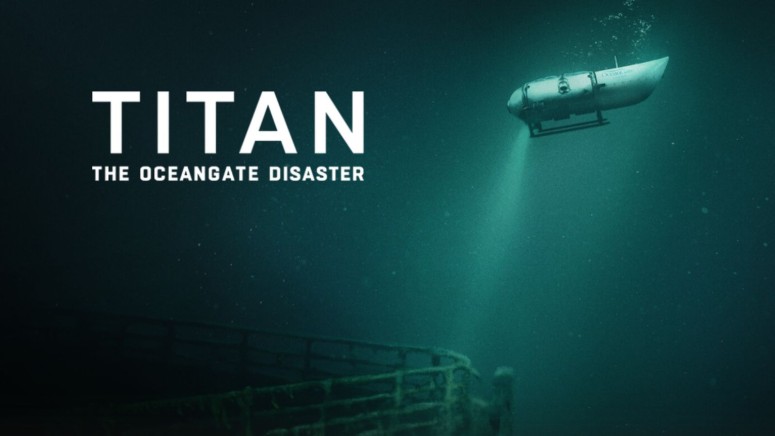
When you purchase through links on our site, we may earn an affiliate commission. Here’s how it works.
Titan: The OceanGate Disaster Documentary — Uncover the Untold Story Behind the Deep-Sea Tragedy
Netflix just dropped the intense trailer for Titan: The OceanGate Disaster, thrusting viewers into the haunting depths of one of the most shocking maritime tragedies in recent history. This gripping documentary promises an unfiltered look at the catastrophic implosion that claimed five lives and stunned the world.
With exclusive insights and never-before-seen footage, it’s set to spark conversations about ambition, innovation, and the cost of pushing boundaries. As anticipation builds around the documentary’s debut, fans of gripping real-life stories will find themselves drawn to the layers beneath the headlines.
The documentary doesn’t just recount events—it peels back the curtain on the man behind the mission and the relentless drive that led to the fateful dive. The chilling trailer reveals tense moments, critical voices, and the high stakes involved in OceanGate’s daring expedition.
This deep dive unpacks everything from the lead-up to the disaster to the questions that still linger today. Expect to discover key revelations, expert analyses, and the untold perspectives that make this tragedy all the more compelling. Stay tuned, as this page will be continuously updated with the latest news and insights—don’t miss out on what might be the most talked-about documentary of the year.
Release date & Where to Watch
The documentary film will make its world premiere at the Tribeca Festival on Friday, June 6, 2025, followed by a Netflix release on Wednesday, June 11, 2025.
What is the plot of Titan: The OceanGate Disaster?
Titan: The OceanGate Disaster is a gripping 2025 documentary that explores the tragic implosion of the Titan submersible and the chilling chain of events that led up to it. Told through whistleblower accounts, exclusive audio recordings, and archival footage from OceanGate’s early days, the film offers a rare, inside look at the flawed decisions, ignored warnings, and unchecked ambition behind one of the most shocking maritime disasters in recent history.
The documentary focuses on Stockton Rush, OceanGate’s charismatic yet controversial CEO, whose dream of revolutionizing deep-sea tourism turned deadly. His attempt to bring luxury travel to the depths of the Atlantic—specifically to the wreckage of the RMS Titanic—resulted in the deaths of all five people aboard the Titan, including Rush himself.
The film probes Rush’s relentless pursuit of innovation, highlighting how he pushed boundaries with unproven technology like a carbon fiber hull. “[Rush] felt the pressure of saying that he was going to do something, and as the years go on and the technology keeps returning these not great answers, that pressure begins to build,” said director Mark Monroe (via Tudum).
Viewers will witness never-before-seen evidence detailing the company’s internal struggles, technical blind spots, and ethical lapses. Monroe added, “The greatest tragedy, and what I hope audiences come to understand, is how this disaster was completely avoidable.”
Speaking to Netflix’s Tudum, Monroe reflected on the broader cultural impact:
“When the Titan submersible went missing, I was horrified and mesmerized by the 24/7 news coverage and global social commentary — just like the rest of the world,” he said.
“There was no context for what could have happened to those onboard, and the only touchpoint was the Titanic, a story that’s now become a grim fairy tale. The more I dug into this terrible tragedy, the more intrigued I became about how this could have ever happened in the first place, and who exactly was the man who built and then went down with this ship. We hope that this film can help provide answers to these very questions,” he further added.
At its core, the documentary challenges viewers to reconsider the cost of ambition when it collides with ego and unregulated exploration. Through personal stories and damning evidence, Titan: The OceanGate Disaster paints a haunting portrait of how human error, overconfidence, and corporate recklessness led to a preventable catastrophe beneath the sea.
Is There a Trailer for Titan: The OceanGate Disaster?
Netflix dropped the intense first trailer for Titan: The OceanGate Disaster. Through gripping firsthand commentary, the trailer pulls viewers into the psychological unraveling behind the doomed expedition. One of the opening lines sets the pace: “There was no way of knowing when the Titan was going to fail, but it was a mathematical certainty that it would fail.”
That stark admission is followed by unflinching insights into Stockton Rush’s mindset. A voice claims: “Stockton fully believed that it would work. He wanted fame. To fuel his ego, fame.” The trailer doesn’t hold back. Another former associate delivers perhaps the most jarring observation: “I thought Stockton was a borderline psychopath. How do you manage a person like that who owns the company?”
Clips of Rush himself, hopeful and enthusiastic, are laced between these warnings—offering viewers a front-row seat to the ambition and risk-taking that led to the tragedy. With its emotional testimonies and pointed revelations, the trailer promises a hard-hitting, no-nonsense look at what went wrong—and the personality behind the decisions that turned fatal.
What was the Titan Submersible?
The Titan submersible was a U.S.-engineered vessel created by OceanGate with the goal of making deep-sea exploration more accessible, particularly by transporting paying passengers to the Titanic wreck site nearly 3,800 meters underwater. Unlike most deep-diving subs built with steel or titanium, Titan featured a unique carbon fiber hull to reduce weight and cost.
“You can’t understand the decisions unless you understand the consequences of the decisions,” Director Mark Monroe said to Tudum. “[Rush] was trying to use carbon fiber … to do something it has never been asked to do before,” Monroe added.
What Happened on the Titan Voyage?
During its descent to the Titanic wreck site, the Titan submersible experienced a catastrophic implosion, instantly killing all five people on board, including OceanGate CEO Stockton Rush. After the vessel lost contact, a massive four-day search effort was launched by the U.S. and Canadian Coast Guards. On June 22, 2023, a remotely operated vehicle located debris from the sub at the bottom of the North Atlantic, confirming the tragic outcome.
Did Anyone die on the Titan Voyage?
Yes, five people tragically lost their lives during the Titan voyage. Among them were OceanGate CEO Stockton Rush, Titanic expert Paul-Henri Nargeolet, and three other passengers—referred to by OceanGate as “mission specialists”—each of whom had paid $250,000 to join the expedition.
Why did the Titan sub Implode?
The Titan submersible imploded because of a structural failure during its descent to the Titanic wreck site. The documentary reveals that OceanGate's unconventional use of carbon fiber for the hull—combined with other risky engineering choices—sparked serious concerns among the company's own employees well before the tragedy occurred.
Why did OceanGate shut down?
OceanGate shut down operations following intense scrutiny and mounting legal challenges after the Titan submersible tragedy. Investigations zeroed in on the company's safety practices and controversial engineering choices that played a role in the fatal incident.
Director Mark Monroe reflects on the broader implications of the disaster, saying, “The film … critiques a segment of society who believe the rules don’t apply to them, and feel well within their rights to break them in the name of something greater” (via Tudum).
He added, “The greatest tragedy, and what I hope audiences come to understand, is how this disaster was completely avoidable.”
Behind the Scenes
Titan: The OceanGate Disaster is a documentary film directed and produced by Mark Monroe. The project delves into the tragic implosion of the Titan submersible and is backed by Netflix as its U.S. distributor.
The film is produced by Lily Garrison, Jon Bardin, and Mark Monroe, with cinematography by Jake Swantko and editing by James Leche. The score is composed by Andrew Skeet and Nathan Klein.
Executive producers include Liz Garbus, Dan Cogan, Kate Barry, Mala Chapple, Tommy Coriale, Jude Gerard Prest, and Amy Herdy—many of whom are producing under the Story Syndicate banner. Noah Broch serves as associate producer.









